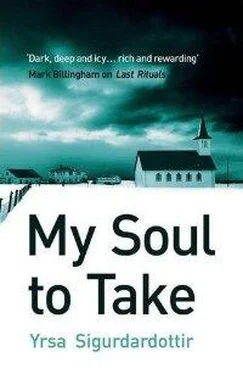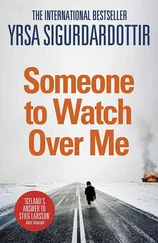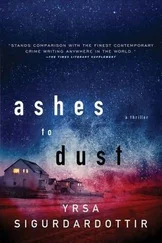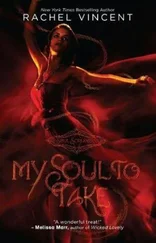Matthew waved his arms. “Who was there to hear, anyway? There’s never anybody out here.”
Thóra looked around, and was about to agree when she noticed two people at the top of the incline leading down to the beach. “You may have spoken too soon,” she said, nodding in their direction.
They watched the pair slowly descend the pebbled slope—a young woman pushing someone in a wheelchair. They could not discern the sex of the occupant, whose head and face were concealed by the hood of his or her coat. The girl seemed to be struggling to move the wheel-chair through the loose shale on the track.
“They must be the young people the Japanese mentioned,” Thóra said. “The ones they saw talking to Birna. Should we have a word with them?” She looked at Matthew.
“Why not?” agreed Matthew. “It wouldn’t be the silliest thing you’ve done for this weird investigation.” He added hastily, “Not that I’m complaining. I’m enjoying it, even though I don’t have the faintest idea where it’s all leading.”
Thóra elbowed him in the ribs. “Have you suddenly turned anarchist in your old age? Come on.”
They set off slowly up the slope toward the pair. At first, when they drew nearer, Thóra thought she must have had something in her eye—no matter how she tried, she couldn’t focus properly on the face visible beneath the hood—but soon she realized there was nothing wrong with her eyes. Her stomach knotted, and she fought the urge to turn back and run. What was wrong with the wheelchair occupant’s features? Although she tried to concentrate on the girl, who was rosy cheeked and smiling, her eyes kept involuntarily returning to the face under the hood and the stretched, shiny pink skin that covered its entire left half. Thóra couldn’t look directly at the man’s disfigured eye sockets, the tragic remnants of his nose, and the scarred, plasticky skin that went from his chin to his forehead, as far as she could see under his deep hood. Thóra prayed that the poor man—who looked young—was unaware of the effect he had, but deep down inside she knew he couldn’t be. She hoped Matthew was coping better than her, but didn’t dare glance over at him in case her expression revealed her horror.
She squeezed out a smile. “Hello,” she said, addressing the girl.
“Hello,” the girl answered, smiling warmly. She had a thick blond ponytail that swung when she spoke. She looked vaguely familiar, but Thóra couldn’t place her. “I’m not sure we’ll make it down here,” the girl said. “And if we do, it’ll be even harder getting back up.”
“There’s not much to see,” replied Thóra. “If you want, Matthew here can help you down.” She pointed at Matthew without looking at him. “And back up, of course.”
“Well, maybe,” the girl said, bending her head over the wheelchair. “What do you reckon?” she asked the man. “Should we accept their help or just turn back? Apparently there’s nothing to see.” The young man mumbled something that Thóra couldn’t hear, but the girl seemed to understand. “Okay, if that’s what you want.” She looked up at Thóra. “I think we’ll just head back. Could he lend me a hand, perhaps?”
Matthew took control of the wheelchair and they all set off up the slope.
“I could have done with your help last Thursday.” The blond girl grinned.
“Thursday?” Thóra said, startled. “Were you here in the evening?” Might the girl and the young man have witnessed something without realizing its significance, or could they be implicated in Birna’s murder? Thóra waited eagerly for the reply, but was disappointed when it came.
“No, we weren’t here,” the girl said, still panting after the ordeal. “We were both planning to go to the séance at the hotel but in the end I went by myself because I couldn’t get the wheelchair over a huge hole that had been dug across the driveway. That was quite a drag because there’s not much going on around here and Steini was looking forward to it.” She rolled her eyes at Thóra. “Actually, he didn’t miss much. It was pretty ridiculous, and I think the medium was a fraud.”
Thóra decided not to ask whether the girl thought any mediums were genuine. She looked back down at the bay. “Were you going beach-combing?” she asked.
“We were just going to see where the body was found,” replied the girl, as if nothing could have been more natural. “We knew the woman who died.”
Deep down, Thóra was relieved. Now she didn’t need to tiptoe around the topic of the murder. “How funny,” she said, as casually as she could. “We were here for exactly the same reason. We wanted to see the scene.”
The girl looked astonished. “Really? Did you know her too?”
Thóra shook her head. “No, not properly. We were connected with her, indirectly. My name’s Thóra.”
The girl held out her hand. “Berta.” She turned away and scanned the beach. “It was awful,” she said sadly. “I heard on the news that she’d been murdered.” She looked back at Thóra. “Why would anyone want to kill her?”
“I have no idea,” Thóra said truthfully. “Perhaps it was nothing to do with her personally. She might just have been in the wrong place at the wrong time and met some lunatic.”
“Do you think so?” Berta asked, a hint of fear on her face. “Here?”
“No,” Thóra said. “I doubt it. But it’s still more likely than a ghost being involved.”
“A ghost!” exclaimed Berta, the color draining from her face. “The fishermen, maybe? This is the same beach where they were washed up.” She shuddered. “I’ve always had a funny feeling about this place.”
Thóra stared at the girl, taken aback. She had expected her to laugh when she’d mentioned ghosts. Clearly the undead were no joking matter in these parts. “Do you believe in ghosts?” she asked carefully.
“Oh, yes,” Berta replied fervently. “It’s haunted around here for sure. I get really scared after dark.”
Not knowing how to answer, Thóra made a mental note that Berta was a potential witness if the compensation claim for the “haunting” ever went through. They made good progress up the slope and Thóra decided to skip ghosts for the moment and get straight to the point. “How did you know Birna?”
“She was the hotel architect. My mother used to own the land, and I helped her out.” She glanced up ahead to where Matthew, with some difficulty, was pushing the wheelchair up the slope. “She was really decent.”
Thóra did not push it, but took the glance to mean that Birna had been kind to the boy in the wheelchair. Then it dawned on her why the girl looked familiar: she closely resembled Elín, her mother, whom Thóra had met when the deeds of sale were drawn up. Perhaps it would be unfair to make her testify against her own family in court, and Thóra hoped it wouldn’t come to that, though it was definitely good to know about her. “What did you do to help Birna out?” she asked.
“She was interested in local history, but neither my mother nor my uncle Börkur could be bothered to discuss it with her. I told her what I knew and looked for old plans and drawings for her. Actually, I couldn’t find any, but I did dig out a few photographs. She was really pleased.”
“Do you remember what they showed?” Thóra asked. She was puzzled. There were plenty of photographs in the basement, more than enough for Birna. Maybe they were all too similar—always the same wall, although with different people.
“Yes, they were mostly of the old farm, my great-grandfather and great-grandmother. There were other people as well, but I didn’t know who they were.” The girl fell silent, then shot an anxious look at Thóra. “Do you reckon I’ll get the photos back? Mum and Uncle Börkur don’t know I lent them to her.”
Читать дальше












